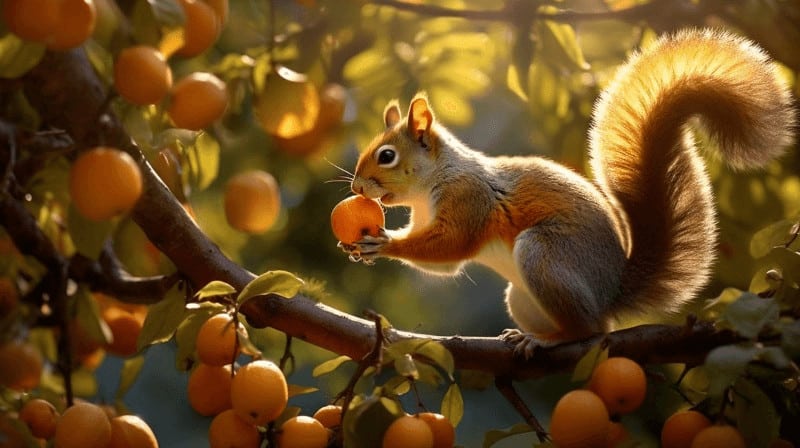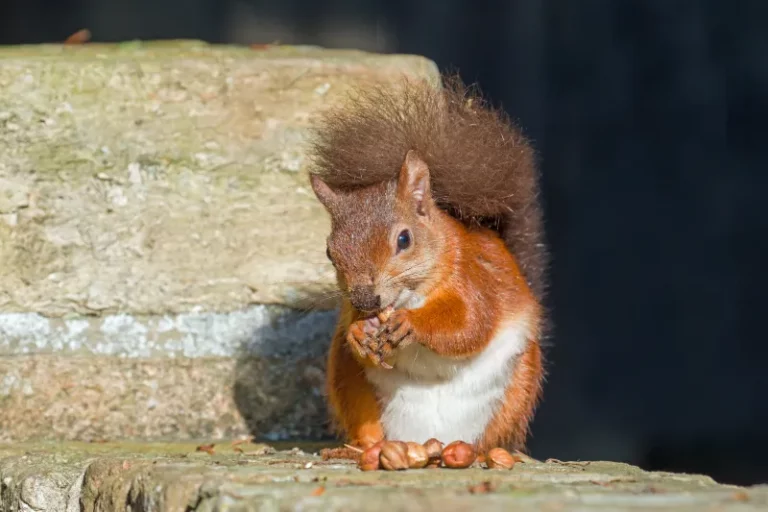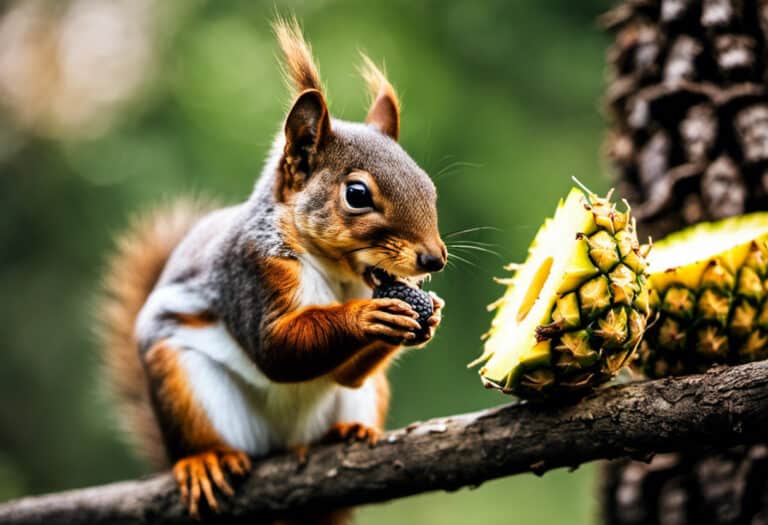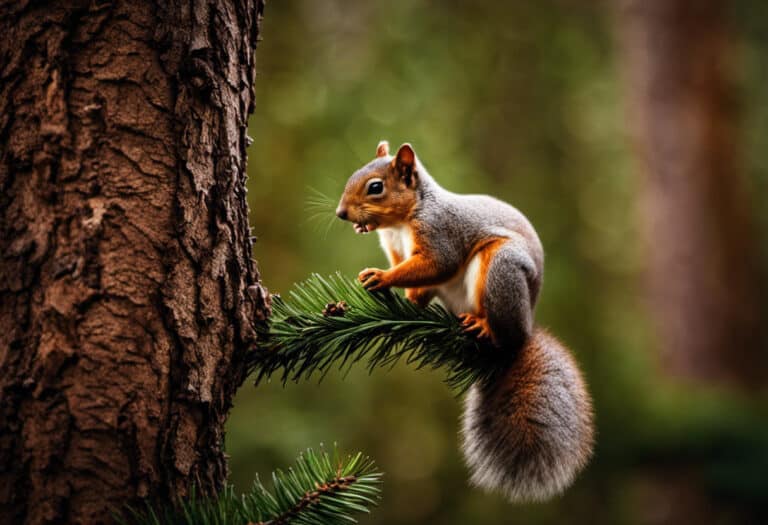Do Squirrels Eat Oranges? Facts & Benefits Revealed!
Regarding squirrels and their eating habits, it’s no secret that they have a diverse diet.
From nuts and seeds to fruits and vegetables, these furry creatures are known for their ability to adapt and find food in various environments.
But what about oranges? Do squirrels eat oranges? Let’s find out!
What Do Squirrels Eat?
Squirrels are omnivores, which means they eat both plants and animals. Their diet primarily consists of nuts, seeds, fruits, vegetables, and insects.
They prefer high-energy foods like acorns, walnuts, and sunflower seeds. However, squirrels are opportunistic eaters and consume whatever is available.
Can Squirrels Eat Oranges?
Oranges are citrus fruits that are rich in vitamin C and other nutrients. While squirrels are not typically known to eat oranges as a part of their natural diet, they may occasionally nibble on them if they come across one.
Squirrels have a natural curiosity; if an orange is within their reach, they might take a bite out of it out of sheer curiosity.
However, it’s important to note that oranges are not a staple of squirrel food. Their digestive systems are not adapted to handle large amounts of citrus fruits. Oranges can be acidic and may cause digestive issues for squirrels if consumed excessively.
If you want to attract squirrels to your backyard or provide them with some treats, it’s best to stick to their preferred foods like nuts, seeds, or even specially formulated squirrel feed. These foods are more suitable for their dietary needs and will be more appealing to them.
Benefits and Risks of Squirrels Eating Oranges
Oranges offer several benefits to squirrels:
- Nutritional Value: Oranges are packed with vitamin C, which boosts the immune system and helps prevent illnesses in squirrels.
- Fiber: The fiber content in oranges aids digestion and promotes a healthy gastrointestinal system for squirrels.
- Hydration: Oranges have a high water content, which helps keep squirrels hydrated, especially during hot summer.
However, there are a few risks associated with squirrels consuming oranges:
- Acidity: Oranges are acidic fruits, and excessive consumption may cause stomach upset or digestive issues in squirrels. Offering oranges as an occasional treat rather than a staple food is essential.
- Sugar Content: Oranges contain natural sugars, which can be harmful if consumed in large quantities. Squirrels should have a varied diet with other fruits and vegetables to maintain a healthy balance.
It’s worth mentioning that while squirrels can eat oranges, they may not be as attracted to them as they are to other foods like nuts or seeds.
Squirrels have different preferences, and some may enjoy oranges more than others. If you offer oranges to squirrels, it’s best to provide them in small, manageable pieces to prevent wastage.
Nutritional Value of Oranges for Squirrels
Oranges are packed with essential nutrients that can benefit squirrels. Here are some key nutrients found in oranges:
- Vitamin C: Oranges are rich in vitamin C, crucial for a squirrel’s overall health. Vitamin C helps boost their immune system and aids in collagen production.
- Fiber: Oranges contain dietary fiber, aiding digestion and promoting a healthy gut for squirrels.
- Antioxidants: Oranges are loaded with antioxidants that help protect cells from damage caused by harmful free radicals.
- Potassium: Oranges are a good source of potassium, an essential mineral that plays a role in maintaining proper nerve function and muscle contractions.
Potential Health Benefits for Squirrels
Including oranges in a squirrel’s diet can provide several health benefits:
- Boosted Immunity: The high vitamin C content in oranges can strengthen a squirrel’s immune system, helping them fight diseases and infections.
- Improved Digestion: The fiber in oranges promotes healthy digestion and can prevent constipation in squirrels.
- Antioxidant Protection: The antioxidants in oranges help protect squirrels’ cells from oxidative stress and may reduce the risk of certain diseases.
- Electrolyte Balance: Oranges’ potassium content can help maintain proper electrolyte balance in squirrels, supporting healthy nerve and muscle function.
While oranges can be a nutritious addition to a squirrel’s diet, it’s important to remember that they should be given in moderation.
Squirrels have specific dietary needs, and a varied diet is essential for their overall health. It’s always best to consult with a wildlife expert or veterinarian before introducing new food into a squirrel’s diet.
How Do Squirrels Interact with Oranges?
When given the opportunity, squirrels eagerly approach an orange and start nibbling. They are attracted to the sweet and tangy taste of the fruit, just like humans. You may even notice them licking the juice off their paws or rubbing their faces against the orange to enjoy the flavor fully.
Squirrels are resourceful creatures, and they have adapted to eating various foods. While nuts and seeds are their primary diet, they consume fruits, berries, and vegetables. Oranges provide a refreshing and nutritious addition to their diet.
Techniques and Approaches for Feeding Squirrels Oranges
If you want to attract squirrels to your yard or provide them with a tasty treat, there are a few techniques you can try:
- Place sliced oranges on a feeding platform or in a squirrel feeder: By offering oranges in a designated area, you can encourage squirrels to come and enjoy them without them getting lost or rolling away.
- Hang orange halves from trees: Squirrels are excellent climbers, so hanging orange halves from branches can provide them with an exciting challenge. They will have fun jumping and climbing to reach the juicy reward.
- Scatter orange slices on the ground: For ground-dwelling squirrels, scattering orange slices on the ground can make it easy for them to access the fruit. This method allows other wildlife, such as birds or rabbits, to enjoy the oranges.
Remember, using fresh oranges and removing seeds before offering them to squirrels is essential. Avoid using spoiled or moldy oranges, which can harm the squirrels’ health.
In conclusion, squirrels do eat oranges and can be seen enjoying this citrus fruit with great enthusiasm. Providing them with oranges in various ways can create an entertaining and rewarding experience for you and the squirrels in your yard.
Protecting Your Orange Trees from Squirrels
Squirrels can be a real nuisance when it comes to your orange trees. They love to snack on the juicy fruit, leaving you with less to enjoy.
But don’t worry; several effective ways to protect your orange trees from these pesky critters exist. Let’s explore some options:
Comparison Table: Protecting Methods
| Method | Features | Pros | Cons |
|---|---|---|---|
| 1. Fencing | Creates a physical barrier- Keeps squirrels out | Provides long-term protection – Deters other animals, too | Can be expensive – May obstruct your view |
| 2. Netting | Prevents squirrels from accessing the trees – Allows sunlight and rain to reach the fruit | Relatively inexpensive – Easy to install and remove | Requires regular maintenance – Can be cumbersome to work with |
| 3. Repellents | Emits odors or tastes that squirrels dislike – Non-toxic options available | Doesn’t harm the squirrels – Can protect multiple trees | May need frequent reapplication – Effectiveness can vary |
| 4. Traps | Catches squirrels for relocation or removal – Can be humane | Provides immediate results – Can be reused | Requires regular monitoring – May not be legal in some areas |
Now that we have compared the different methods let’s dive into the steps you can take to protect your orange trees from squirrels:
- Inspect your trees: Take a close look at your orange trees to identify any areas where squirrels may be accessing them. Look for signs of nibbling or chewed branches.
- Install fencing: If you choose fencing, ensure it is at least 3 feet high and buried a few inches into the ground to prevent squirrels from digging underneath. Secure the top of the fence to prevent squirrels from climbing over.
- Use netting: Cover your orange trees with netting, ensuring that it is securely fastened at the bottom to prevent squirrels from getting in. Ensure the net is large enough to accommodate the growth of the fruit.
- Apply repellents: Choose a squirrel repellent that is safe for use on citrus trees. Follow the instructions carefully and apply it to the trunk and branches of your orange trees. Reapply as directed to maintain effectiveness.
- Set traps: If trapping is legal in your area, consider using live traps to catch and relocate squirrels. Place the traps near the base of the trees or along their usual paths. Check the traps regularly and release the captured squirrels in a suitable location away from your property.
Following these steps and the above methods, you can protect your orange trees from squirrels and ensure a bountiful harvest. Remember to monitor your trees and make adjustments as needed regularly. Happy gardening!
FAQ:
Are oranges a part of a squirrel’s natural diet?
Squirrels usually eat nuts, seeds, fruits, and veggies. Oranges are not a big part of their diet, even though they might sometimes try them. Squirrels prefer nuts and seeds because they give them nutrients and energy. So, while squirrels might like oranges, they don’t rely on them for food in the wild.
Are oranges safe for squirrels to eat?
Squirrels can eat oranges. Oranges have vitamin C, fiber, and antioxidants for squirrels. But don’t give them too much; it can upset their tummy. Take out the seeds first; they can choke on them. Oranges are healthy and yummy for squirrels, but give them in small amounts with other foods.
Can squirrels digest oranges easily?
Squirrels can eat oranges because their bodies can break down and use nutrients. But, even though squirrels can eat oranges, they might not like them as much as other foods. Squirrels eat many different things, so oranges are just one option.
Can squirrels eat both the flesh and the peel of oranges?
Squirrels can eat oranges, including the flesh and the peel. They usually eat nuts, seeds, and fruits, but they can also have oranges. Oranges have vitamins and minerals that are good for squirrels. They might nibble on the peel but shouldn’t overeat. Oranges should be given to squirrels as a treat, not always.
Should I remove the seeds from oranges before feeding them to squirrels?
It’s better to take out the seeds from oranges when giving them to squirrels. Squirrels can eat oranges, but the seeds can make them choke or have tummy problems. Squirrels have tiny throats and might be unable to chew and swallow the seeds well, which can cause blockages or make them feel bad. Some citrus seeds can even poison animals if they eat too many. To keep the squirrels healthy and safe, taking out the seeds before giving them oranges as a treat is best.
How often can I feed oranges to squirrels?
Squirrels can have oranges as a treat, but not too often. Oranges have a lot of sugar, so too much can make squirrels sick. It’s better to give them oranges only once or twice a week. Also, remember to provide them with small pieces because squirrels have small stomachs. And take out any seeds or pits because those can hurt their tummies. It’s good for squirrels to have oranges occasionally, but not too much.






